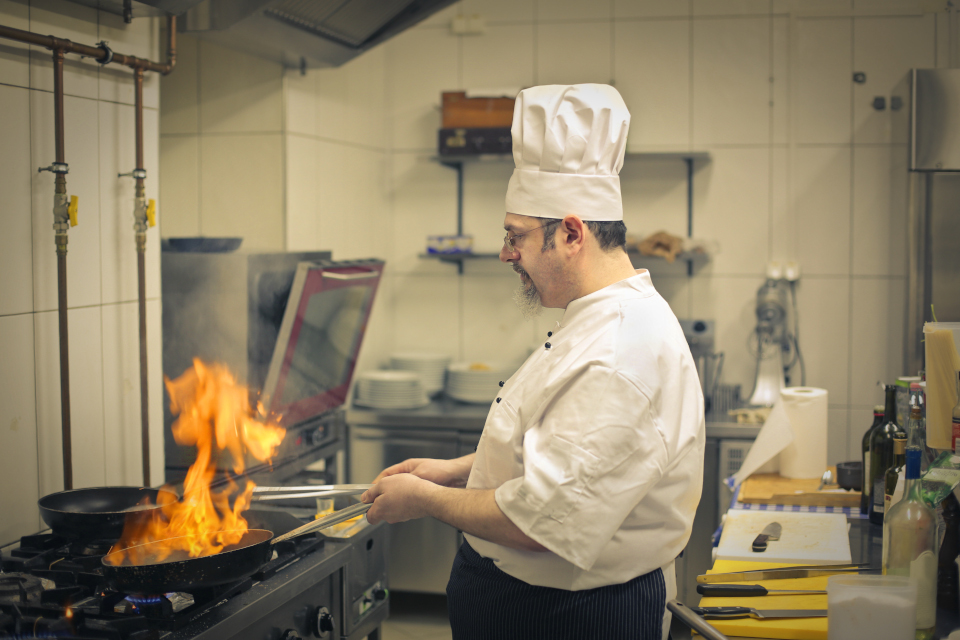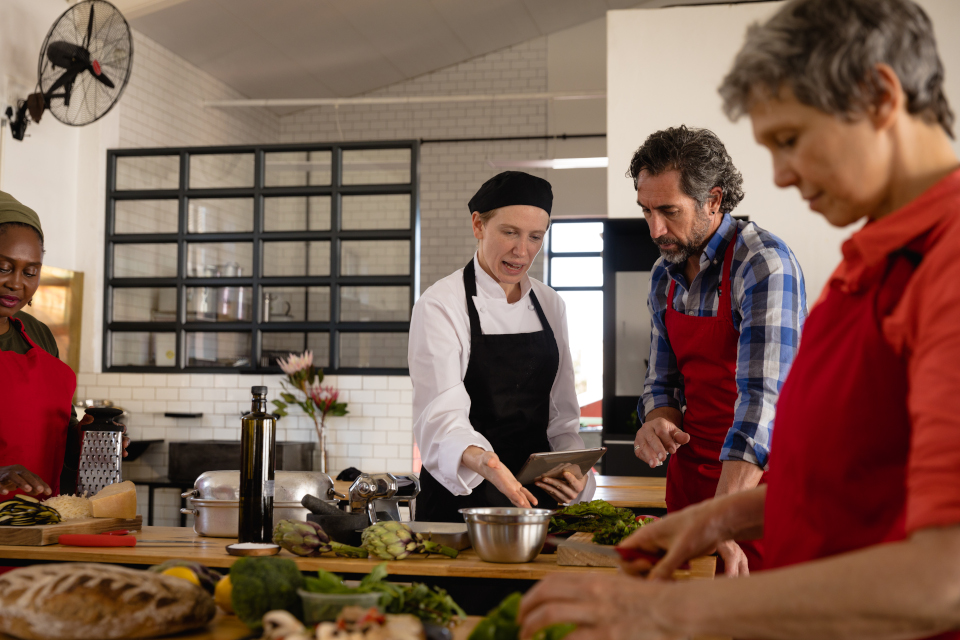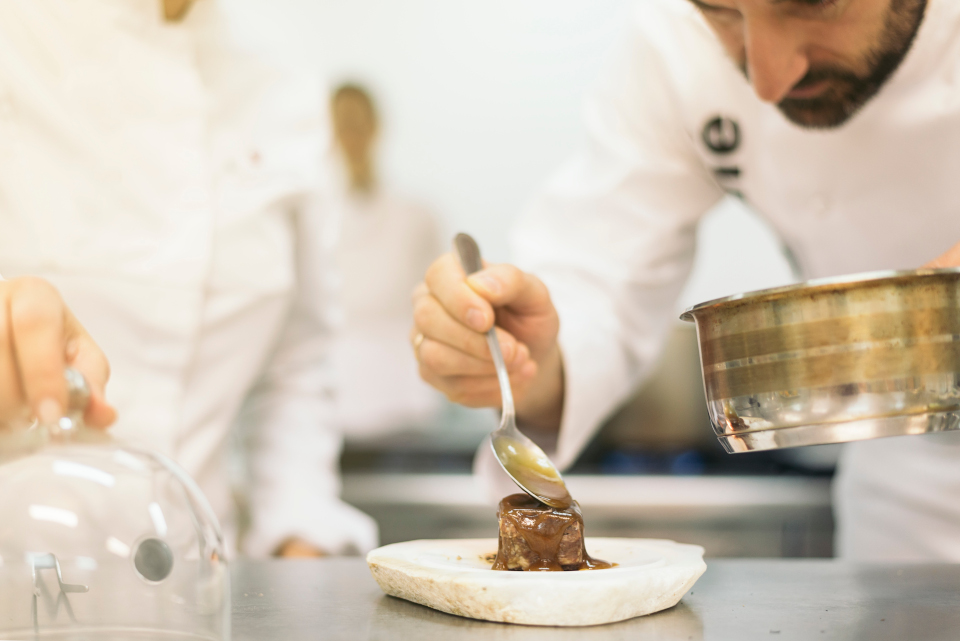
Do you love the idea of being a chef, creating delicious dishes and bringing joy to diners’ faces?
Can you foresee yourself thriving in a bustling kitchen?
Well, it sounds like you’re keen to pursue a career as a chef! Why not, it’s a super rewarding line of work with a lot of perks.
In this article we will walk you through the steps you’ll need to take to embark on a professional career in the kitchen. In order to qualify for the best jobs, you’ll need to explore your study options, which will lead to work placements, apprenticeships and other career pathways.
With flexible commercial cookery courses at your doorstep, you could get qualified and be well on your way to becoming a chef in no time.
Reasons to Become a Chef
Let’s start at the beginning: what is your why? What about commercial cookery speaks to you?
Is it a passion for seasonal produce? A love for flavour combinations? Does working in a kitchen just seem like the right fit for you?
There are a lot of reasons to go for a career as a chef and the inspiration to go in this direction is unique for everyone
Every so often a student or friend will ask me “why did you get into the hospitality industry?” and the answer has never changed, I just want to make people happy. To be able to feed my passion (literally) to those around me makes me the happiest man in the world.
Anthony Paterson, Culinary Trainer TAFE Gippsland
Firstly, it’s a creative line of work: the sky's the limit with flavour combinations and food preparation. Once you reach a certain status in a commercial kitchen, you’ll be able to add your personal touch to existing menus, updating weekly specials and create new dishes altogether.
Excitement: as a chef, there’s never a dull moment. Despite being on your feet all day and into the night and working under pressure, no two days are the same. This can make your role as a chef a fun and rewarding experience.
Work anywhere! Think about it: everyone eats - all over the world. There will always be a demand for talented chefs, especially in metropolitan areas. This means that you could take your career on the road or even overseas.
Self employment opportunities: are you interested in becoming a business owner? Why not open your own restaurant or cafe! A Certificate IV in Commercial Cookery will equip you with the skills you need to start your own business. Once you’ve completed your qualifications and are confident with your skills, you could open a food establishment of your very own where you have creative license over the menu and literally everything else.
Why Hospitality Industry as a Career Option
In Australia, we have lots of options when it comes to choosing a profession. The world is our oyster so to speak. So why enter the hospitality industry?
The hospitality world offers you a lifestyle that truly differs from the rest. One of the biggest differences of being employed in hospitality is that you'll most likely enjoy an alternative to the nine to five type workday. You might work nights and weekends but you can also avoid getting stuck in a repetitive routine.
Securing a job in hospitality can be more of a clear cut process compared to entering other industries. This is because the qualifications you need are recognised Australia-wide. While you’re studying, you can apply for work placements and apprenticeships, getting your foot in the door. There’s also a good chance that you can experience a quick progression. If you attain your qualifications, work hard and show initiative, you can climb the ladder into more senior positions pretty quickly.
And don’t forget the perks! Working in a commercial kitchen can be demanding but it also opens the door to a secret world that only hospitality workers get to enjoy. That plus access to high quality ingredients that you can experiment with. On top of this, the busy, bustling kitchen environment is definitely conducive to creating a supportive, family-like atmosphere.

Types of Hospitality Careers
Another great part of entering the hospitality industry is the variety. You’ll never be pigeonholed or stuck in the same type of role when you have hospitality skills under your belt. This is especially the case when it comes to commercial cookery and cheffing positions.
Depending on your experience, there are various types of cooking jobs you can explore. Then there are the kinds of establishments in which you can carry out your duties. Throw in the fact that you can go for a job literally anywhere and the possibilities are endless.
Once you’ve completed a Certificate III in Commercial Cookery, you’ll be qualified to be a cook in restaurants, cafes, bistros, clubs, cruise ships, resorts, local sporting clubs, not for profit community organisations, event catering, pubs, aged care facilities, reception centres and more.
If you want to explore other, more advanced hospitality careers, you can enrol in a Certificate IV in Commercial Cookery course. A Certificate IV with an apprenticeship is also an option. Completion of either stream would make you more qualified to apply for upper level roles such as: Chef de Partie, Commis Chef, Demi Chef and Sous Chef. The sky's the limit for hospitality careers, giving you the freedom to stay in one place and move up or try out different roles, establishments and locations.
Chef Qualifications Australia
As you may imagine, the steps you need to take in order to become a professional chef differs across the globe. When seeking employment in Australia, you will most likely need either a Certificate III, a Certificate IV to be considered. The good news is that the commercial cookery courses on offer at TAFE Gippsland are accredited and offer flexible study options. You can do a Certificate III full time or part time at three of our campuses - Bairnsdale, Leongatha or Morwell. There are also Free TAFE and Job Trainer opportunities. For the Certificate IV in Commercial Cookery, the course is offered online with on-campus workshops held at the Morwell campus. For the Certificate IV in Commercial Cookery Apprenticeship, classes are conducted online and in the workplace. Once you complete your qualifications, you’ll be able to apply for cheffing roles all over Australia.
How Long Does it Take to Become a Chef
When starting out on a new career path in the hospitality industry, be prepared to invest some time. So before you start trying on your chef’s hat, you’ll need to complete your qualifications and then gain some experience. The best commercial cooking experience is through apprenticeships and work placements as you'll be working on the job - and getting paid, too! The time commitment shouldn’t deter you from going down this path. The journey to becoming a chef can be half the fun. With both Certificate III and Certificate IV in Commercial Cookery courses available through TAFE Gippsland, you can start by enrolling today. Apprenticeships are available as well. As far as your potential timeline goes, there are quite a few scenarios but one probable situation could be the following:
- Enrol in the Certificate III of Commercial Cookery and attend full time. After 10 months, you’ll have completed your studies with a wealth of knowledge. During your course, you will have attended scheduled restaurant training sessions and work placements. At this stage you’ll have the skills to work as a qualified cook in a variety of places. And you’ll be eligible to enrol for a Certificate IV in Commercial Cookery.
- Jump straight into a Certificate IV in Commercial Cookery which takes two years to complete online, along with on-campus workshops. During this time you’ll learn the business skills to run a successful commercial kitchen. Upon completion, you will have the qualifications to hold a supervisory or team leader role in the kitchen. This could be roles such as Chef de Partie, Commis Chef, Demi Chef and Sous Chef.
From this proposed timeline, and if you devote yourself, you could very well be working in one of the above roles in under three years. Keep working hard and you could eventually move up into a Head Chef or Executive Chef role.

Working in a Professional Kitchen
Think into the future: you’ve well and truly committed to your commercial cookery courses. You’ve learned the skills, now it’s time to put them into practice. Studying cookery is great but when it’s time to step into work in a professional kitchen, we want you to be prepared.
First of all, get ready for some fast-paced excitement. When you work in commercial kitchens, you’ll soon learn that no two days are ever the same. Kitchens are hot and busy places suited to high energy and passionate individuals. Are you suited to the heat? As the saying goes, If you can't stand the heat, get out of the kitchen. Commercial kitchens can often be hot environments but this is something you’ll get used to in time. Just be sure to stay hydrated, plus a short visit to the walk-in fridge/freezer can be a welcome break.
When it comes to service time, things can get a little hectic in the kitchen. Do not fear, this is something that comes with the territory. Many chefs love the rush of a busy dinner service. After all, mouths need to be fed and fed quickly. If you ever need a quick breather, there’s nothing stopping you from making time for small breaks from the kitchen for a few minutes at a time.
Another thing to prepare for is late nights and split shifts. The plus side is that you’ll have a new “kitchen family” to spend time while at work. Bonds made in the kitchen often turn into lifelong friendships. It can all be a bit of a transition, but hopefully you enjoy the benefits and excitement of the kitchen so much that it’s all worth it in the end. As a bonus you would usually get time off during the week – the quiet time when most people are at work.
Experience in Hospitality Industry
Gaining experience is 100% the key for a successful career in the hospitality industry. Whether it’s an apprenticeship or even starting as a dishwasher, this kind of experience is nothing but helpful if you want to start moving up in the industry. When working in a restaurant or cafe, even an entry level role will help you understand how a commercial kitchen works. You’ll also have the chance to make friends and contacts that could lead to future opportunities.
The easiest way to start gaining experience would be through the work placements organised through your commercial cookery course. TAFE Gippsland assists with work placements and has specialists on hand to provide advice about ways to enhance your employment opportunities.
Ideally you will be able to score an apprentice position, as learning and gaining experience on the job is the best case scenario when starting out in the hospitality industry. The bonus? Apprentices get paid!
Hospitality Courses Victoria
So are you ready to take the plunge into the hospitality industry and moving towards working in a commercial kitchen? If so, TAFE Gippsland has the commercial cookery courses you need to either get started or to get you upskilled and ready to take on bigger and better opportunities. There are Certificate III and IV programs available both with and without apprenticeships. Flexible learning is on offer as well as opportunities to apply for Free TAFE and Job Trainer.
If you’re already working in the industry and looking to start studying soon, you can enrol and start a Certificate III apprenticeship or a Certificate IV at any time. If you have any questions about the process or about the courses in general, reach out today and one of TAFE Gippsland’s friendly recruitment officers is at the ready to help you begin your enrolment journey.
Conclusion
Getting qualified and seeking out a career as a professional chef is a wildly exciting prospect and will no doubt be a journey you’ll never forget. The best move for someone starting out is to study hard and learn from the best. The way to do this is by enrolling at an accredited TAFE such as TAFE Gippsland and complete a certification where you will gain all the skills and knowledge needed to break into the hospitality industry. Once you’ve completed your qualifications and gained some experience, there’s nothing stopping you from taking the hospitality world by storm and creating culinary magic as chef in a commercial kitchen.